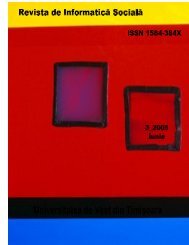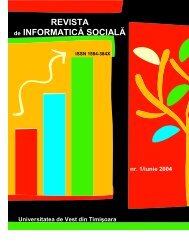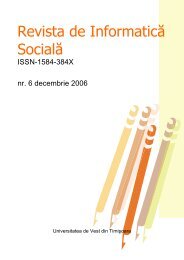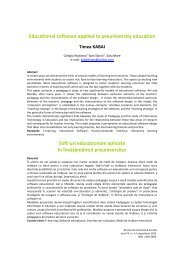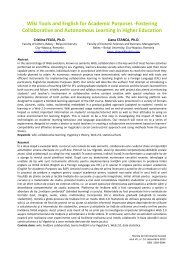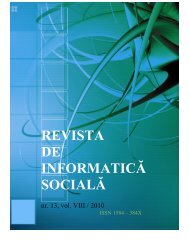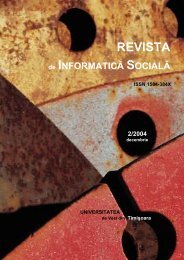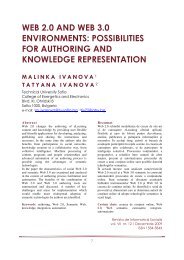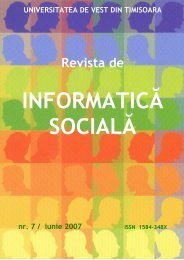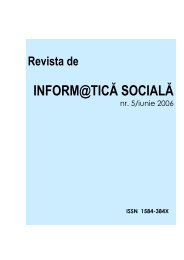1. WIKI AS A TOOL FOR LEARNING ENGLISH1.1. General BackgroundDue to the large circulation <strong>of</strong> English for communication in most domains, interest for teaching /learning English as a Foreign Language is extremely high. Of late, a series <strong>of</strong> surveys have focussedon the impact <strong>of</strong> social media tools on the learning <strong>of</strong> English. For instance, Schwartz reports(Schwartz, 2003) that wikis have been successfully implemented by 24 universities in Canada, UK,USA, New Zealand, and Germany for distance learning programmes in applied disciplines.However, for the purposes <strong>of</strong> this research, we have examined only European projects that haveintroduced social media tools for the learning <strong>of</strong> the English language in a European Union membercountry. Exten<strong>de</strong>d information is provi<strong>de</strong>d in the Study on the impact <strong>of</strong> information andcommunication technology (ICT) and new media on language learning, which was conductedbetween June 2008 and May 2009 (Resnick, 1991). Its main goal was to i<strong>de</strong>ntify trends,opportunities and practices beyond schools and universities, in pr<strong>of</strong>essional / working and personallife, including the use <strong>of</strong> ICT and new media in formal, non-formal and informal language learning.The participant countries were the UK, Greece, Cyprus, Finland, Spain, Hungary, France andGermany. The report emphasises that learning takes place in an environment conducive to learners’critically evaluating the usefulness <strong>of</strong> the learning material and <strong>de</strong>termining its potential value fortheir personal and pr<strong>of</strong>essional life. Actually, recommendations formulated by the authors <strong>of</strong> thereport concern the best options for qualitatively and quantitatively optimum learning methods inrelation to time resources and personal aspirations. Besi<strong>de</strong>s cost and age limitations as to the use <strong>of</strong>ICT in language learning, the survey highlighted another interesting barrier, this time related toattitu<strong>de</strong>, namely for most subjects language learning is “intrinsically related to face-to-facecommunication and immersion in the target culture, in ‘real’ (physical) rather than ‘virtual’settings” (Resnick, 1991; Schwartz, 2003). However, while adults seem to use frequently massmedia, BBC-like sites and social networks to learn non-formally and informally a foreign language,younger learners (pupils, stu<strong>de</strong>nts) have shown increased interest for Web 2.0 tools such as wikis,blogs, social bookmarking for study purposes in both formal and non-formal settings.The findings and the recommendations <strong>of</strong> this ample survey have further substantiated our <strong>de</strong>cisionto introduce the wiki as learning environment based on the social constructivist premises mentionedin the introduction, where acquisition <strong>of</strong> a foreign language can be seen as the result <strong>of</strong> thecollaborative effort <strong>of</strong> a community cumulated with individual en<strong>de</strong>avour.1.2. Local ContextRecent data from Europe’s Digital Competitiveness Report (2009) show Romania both rankingrelatively mo<strong>de</strong>stly in terms <strong>of</strong> internet usage and internet skills and having un<strong>de</strong>rgone someprogress as well. Thus, as compared to 2006, Internet usage in terms <strong>of</strong> general activities hasincreased significantly. Yet, less than 38% <strong>of</strong> the population uses the Internet for communication,from which 19% on a daily basis and the rest at least once a week. Internet usage for educationalpurposes is still timid, accounting for only 3% <strong>of</strong> the users. Yet, in comparison with 2006, when 8%<strong>of</strong> the users accessed the Internet to seek information for learning purposes, in 2009, the percentageincreased to 25%, which represents a significant growth if we take into account Romania’seconomic situation and the <strong>de</strong>gree <strong>of</strong> Romanians’ access to technology (Preda, Stanica, Crisan,2010).In an optimistic view, we can say that Romanians’ usage <strong>of</strong> the Internet for daily activities hasincreased. The authors consi<strong>de</strong>r that if the increase <strong>of</strong> Internet usage in all areas continues at asimilar pace with that registered in the interval 2006-2009, a significant advance will become a
eality. Besi<strong>de</strong>s being an additional incentive, these data have confirmed that our initiative toimplement a collaborative learning platform was a good <strong>de</strong>cision.In Romania, the present period is <strong>de</strong>fined by attempts to change higher education into a moreresearch and market based system as well as by the accomplishment <strong>of</strong> the transition to the moreflexible Bologna system. In terms <strong>of</strong> critical competencies, early 21st century policies followed byour country state that “critical thinking, generalist (broad) competencies, ICT competenciesenabling expert work, <strong>de</strong>cision-making, handling <strong>of</strong> dynamic situations, working as a member <strong>of</strong> ateam, and communicating effectively” (Seitzinger, 2006) are required <strong>of</strong> active members <strong>of</strong> presentdaysociety.Pioneering research and projects on the impact <strong>of</strong> Web 2.0 technologies in teaching/learning inRomanian secondary and higher education by our colleagues Gabriela Grosseck (West University<strong>of</strong> Timisoara), Carmen Holotescu (Polytechnic University <strong>of</strong> Timisoara), and Anisoara Pop(Dimitrie Cantemir University in Targu-Mures date back as early as 2003-2004. The results <strong>of</strong> theirresearch in this area have been an encouragement for the authors <strong>of</strong> the present study and a sign thatsmall steps taken in the right direction will finally cumulate in a critical mass that would <strong>de</strong>terminethe long expected change, especially in terms <strong>of</strong> attitu<strong>de</strong> towards what currently is called “thelearning revolution.”1.3. Language learning at tertiary level and Web 2.0 toolsIn language learning at tertiary level, the traditional teaching methods such as “presentationpractice-production,”followed by communicative, task-based, or project-based methods aregradually being replaced by a “post-method” stage (Harriman, 2010: pag. 78) where a prior analysis<strong>of</strong> the learning context, together with macro strategies such as maximization <strong>of</strong> learningopportunities, facilitating negotiation, fostering language awareness, promoting learner autonomyetc. (Kumaravadivelu, 2001, 2006, quoted in Harmer, 2007: pag.78) and reflective practice woul<strong>de</strong>nsure optimum results. This way, both teacher and stu<strong>de</strong>nts can participate in curricular andsyllabus <strong>de</strong>cision, as well as in choosing the most a<strong>de</strong>quate/ efficient methods that take into accountcultural, social and personal variables.Another factor to have played an important role in the change <strong>of</strong> paradigm in language teaching isthe <strong>de</strong>velopment <strong>of</strong> digital literacy and <strong>of</strong> the view according to which, rather than simple assistivetools for transmission <strong>of</strong> information, technology-enhanced learning environments are conducive tohigher cognitive performance. One <strong>of</strong> the foremost promoters <strong>of</strong> this paradigm shift, David H.Jonasen, claims that“Constructivist mo<strong>de</strong>ls <strong>of</strong> instruction strive to create environments wherelearners actively participate in the environment in ways that are inten<strong>de</strong>d tohelp them construct their own knowledge, rather than having the teacherinterpret the world and ensure that stu<strong>de</strong>nts un<strong>de</strong>rstand the world as theyhave told them. In constructivist environments, like cognitive tools, learnersare actively engaged in interpreting the external world and reflecting ontheir interpretations. This is not in the sense that learners activelylisten and then mirror the one correct view <strong>of</strong> reality, but rather "active" inthe sense that learners must participate and interact with the surroundingenvironment in or<strong>de</strong>r to create their own view <strong>of</strong> the subject”(Harriman, 2007)
- Page 1:
Revista de Informatica Sociala 14 /
- Page 7: ● ● ●CONTENTS● ● ●[9-20
- Page 10 and 11: THE TRANSITION FROM OLD TO NEW MEDI
- Page 12 and 13: 30252023.420.325.11510500.85.5Never
- Page 14 and 15: Overall, we can therefore sum up on
- Page 16 and 17: n.a.I often use itI seldom use it6.
- Page 18 and 19: - Traditional web use: searching th
- Page 20 and 21: 19. Kvavik R.B., Caruso J.B. and Mo
- Page 22: IntroductionIn 1995, Bernie Dodge o
- Page 25 and 26: The Web-Inquiry Project [WIP] is a
- Page 27 and 28: and even orally. The teacher will a
- Page 29 and 30: environment in which the teacher gu
- Page 31 and 32: Transformation Through Online Learn
- Page 33 and 34: INTRODUCTIONLeading practitioners a
- Page 35 and 36: learning. We also describe how the
- Page 37 and 38: Some of these transformations are b
- Page 39 and 40: Recently, Twigg has received suppor
- Page 41 and 42: Stage III: Unbundled Learning, Mark
- Page 43 and 44: perhaps using Second Life-like virt
- Page 45 and 46: performance. Indeed, Stage V will l
- Page 47 and 48: Free-Range Open LearningOver time,
- Page 49 and 50: New communities, tools and services
- Page 51 and 52: Embed enterprise-wide predictive an
- Page 53 and 54: In collaboration with Strategic Ini
- Page 55: Wiki Tools and English for Academic
- Page 59 and 60: StudentPage 1StudentPage nTeacher
- Page 61 and 62: 100%90%80%70%60%50%40%30%20%10%0%Ac
- Page 63 and 64: 200Correlation View/Page Edits150Vi
- Page 65 and 66: 14. http://eacea.ec.europa.eu/llp/s
- Page 67 and 68: Simularea şi comunicarea electroni
- Page 69 and 70: RespondenţiRăspunsuriLa nivelul
- Page 71 and 72: RespondenţiRăspunsuriLa nivelul
- Page 73 and 74: Respondenţii au fost rugaţi să i
- Page 75 and 76: Itemul 9 doreşte să identifice ti
- Page 77 and 78: Identificara opţiunii, chiar şi p
- Page 79 and 80: EşantioaneRăspunsuri/Ranguriagita
- Page 81 and 82: modalităţile practice prin care u
- Page 83 and 84: 1. INTRODUCEREÎn prezent, complexi
- Page 85 and 86: Figura 1. Analiza grafică a evolu
- Page 87 and 88: Faţă de această situaţie se deg
- Page 89 and 90: variabilele acesti noi culturi cybe
- Page 91 and 92: INTRODUCEREÎncă din anul 2000 am
- Page 93 and 94: după tipul lecţiei: prezentare de
- Page 95 and 96: Funcţiile oferite de AEL asigură
- Page 97 and 98: • elevi/studenţi, beneficiari di
- Page 99 and 100: Se poate folosi cadrul formal de co
- Page 102 and 103: Evaluarea formativă este comentari
- Page 104 and 105: Rezultatele elevilor, pe itemi:Diag
- Page 106 and 107:
Nr. Denumirea activităţii AEL MOO
- Page 108 and 109:
SEMNAL EDITORIALLaura MALITA, Vanna
- Page 110:
IN MEMORIAMConstantin TraianCHEVERE



